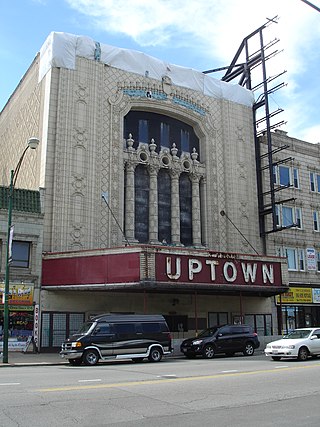See also
- Fox Theatres, a defunct chain of movie theaters
Fox Theatre or Fox Theater or Fox Theater Building may refer to:
Riverside may refer to:
The Colosseum is an elliptical amphitheater in Rome, Italy.

Pomona is a city in eastern Los Angeles County, California, United States. Pomona is located in the Pomona Valley, between the Inland Empire and the San Gabriel Valley. At the 2020 census, the city's population was 151,713. The main campus of California State Polytechnic University, Pomona, also known as Cal Poly Pomona, lies partially within Pomona's city limits, with the rest being located in the neighboring unincorporated community of Ramona.

A theatre in the round, arena theatre, or central staging is a space for theatre in which the audience surrounds the stage.

The League of American Bicyclists (LAB), officially the League of American Wheelmen, is a membership organization that promotes cycling for fun, fitness and transportation through advocacy and education. A Section 501(c)(3) nonprofit organization, the League is one of the largest membership organizations of cyclists in the United States.

A movie palace is a large, elaborately decorated movie theater built from the 1910s to the 1940s. The late 1920s saw the peak of the movie palace, with hundreds opening every year between 1925 and 1930. With the advent of television, movie attendance dropped, while the rising popularity of large multiplex chains in the 1980s and 1990s signaled the obsolescence of single-screen theaters. Many movie palaces were razed or converted into multiple-screen venues or performing arts centers, though some have undergone restoration and reopened to the public as historic buildings.

Fox Theatres was a large chain of movie theaters in the United States dating from the 1920s either built by Fox Film studio owner William Fox, or subsequently merged in 1929 by Fox with the West Coast Theatres chain, to form the Fox West Coast Theatres chain. Fox West Coast went into bankruptcy and was sold to The National Theatres Corporation, led by Charles Skouras, on November 19, 1934, for $17,000,000.00. Eugene Klein later became CEO of National, and turned it into the conglomerate National General. Mann Theatres bought National General's theatres in 1973.
Orpheum is a name often used for theatres or other entertainment venues. It may refer to:

The Fox Oakland Theatre is a 2,800-seat concert hall, a former movie theater, located at 1807 Telegraph Avenue in Downtown Oakland. It originally opened in 1928, running films until 1970. Designed by Weeks and Day, the theatre is listed on the National Register of Historic Places. It was refurbished in the 2000s and reopened as a concert venue on February 5, 2009.

America's 11 Most Endangered Places or America's 11 Most Endangered Historic Places is a list of places in the United States that the National Trust for Historic Preservation considers the most endangered. It aims to inspire Americans to preserve examples of architectural and cultural heritage that could be "relegated to the dustbins of history" without intervention.
Uptown Theatre or Uptown Theater may refer to:

Boller Brothers, often written Boller Bros., was an architectural firm based in Kansas City, Missouri which specialized in theater design in the Midwestern United States during the first half of the 20th century. Carl Heinrich Boller (1868–1946) and Robert Otto Boller (1887–1962) are credited with the design of almost 100 classic theaters ranging from small vaudeville venues to grand movie palaces.
The Nederlander Organization, founded in 1912 by David T. Nederlander in Detroit, and currently based in New York City, is one of the largest operators of live theaters and music venues in the United States. Its first acquisition was a lease on the Detroit Opera House in 1912. The building was demolished in 1928. It later operated the Shubert Lafayette Theatre until its demolition in 1964 and the Riviera Theatre, both in Detroit. Since then, the organization has grown to include nine Broadway theaters, making it the second-largest owner of Broadway theaters after the Shubert Organization, and a number of theaters across the United States, including five large theaters in Chicago, plus three West End theatres in London.

The Robert Morton Organ Company was an American producer of theater pipe organs and church organs, located in Van Nuys, California. Robert Morton was the number two volume producer of theatre organs, building approximately half as many organs as the industry leader Wurlitzer. The name Robert Morton was derived not from any person in the company, but rather from the name of company president Harold J. Werner's son, Robert Morton Werner.
Majestic Theatre or Majestic Theater may refer to:
Granada Theater may refer to:
A Shakespeare festival is a theatre organization that stages the works of William Shakespeare continually.
Clifford Allison Balch was an American architect specializing in movie theater design. Balch designed several theaters in the Southern California across four decades, including the National Register of Historic Places-listed Golden Gate Theater and Pomona Fox Theatre.